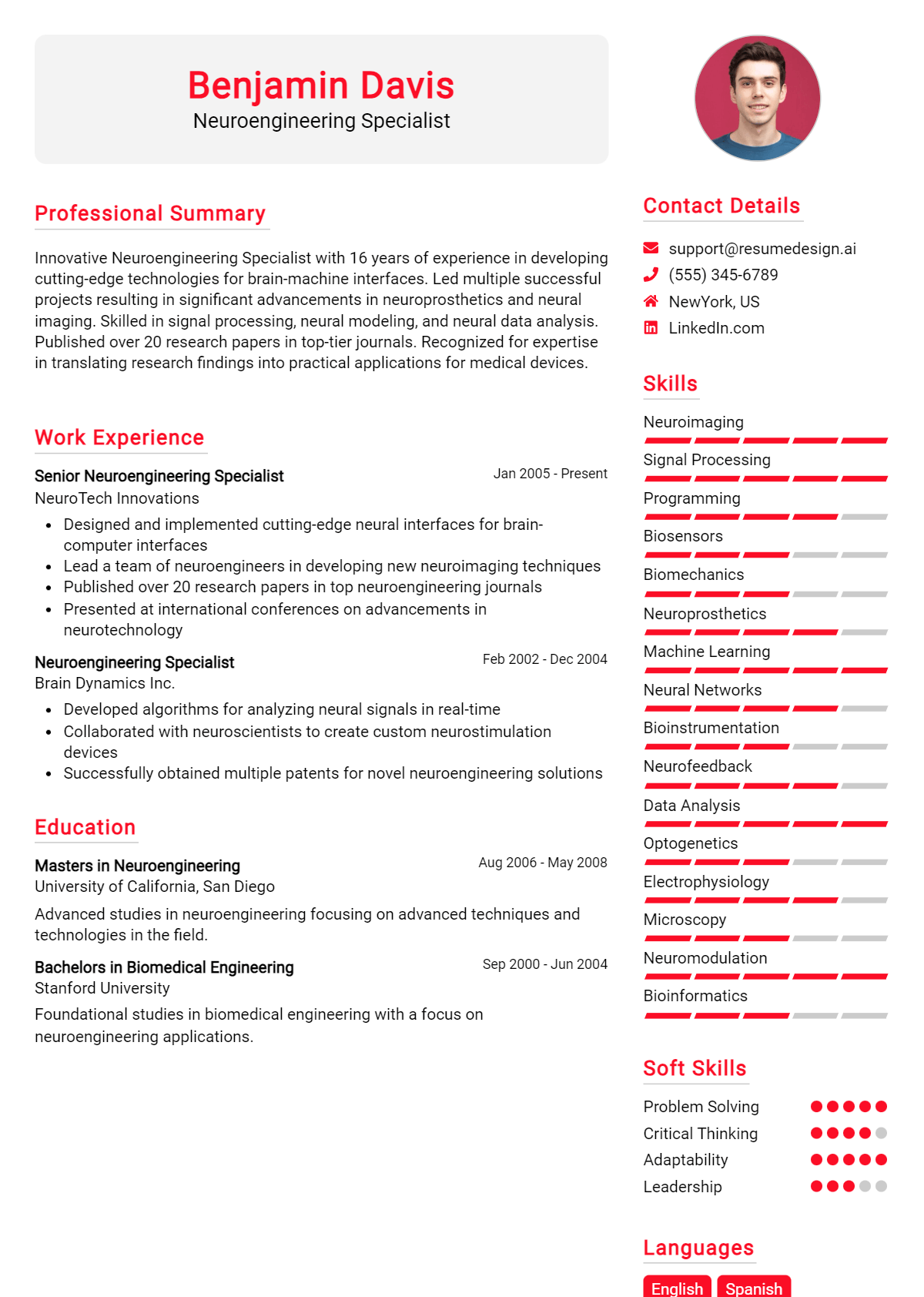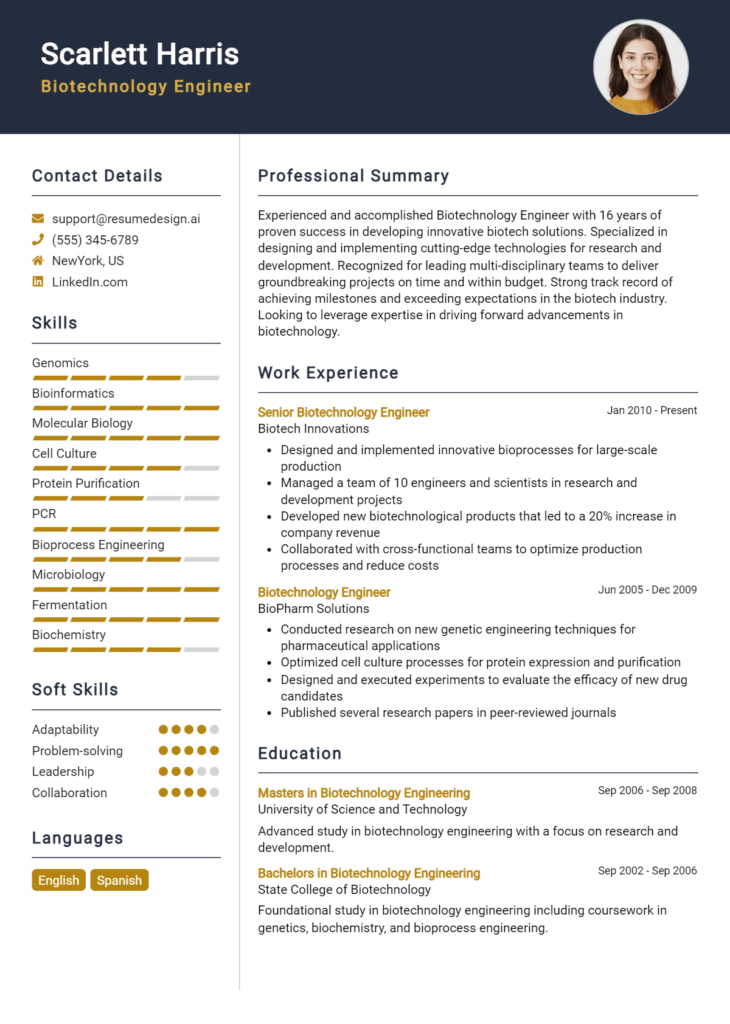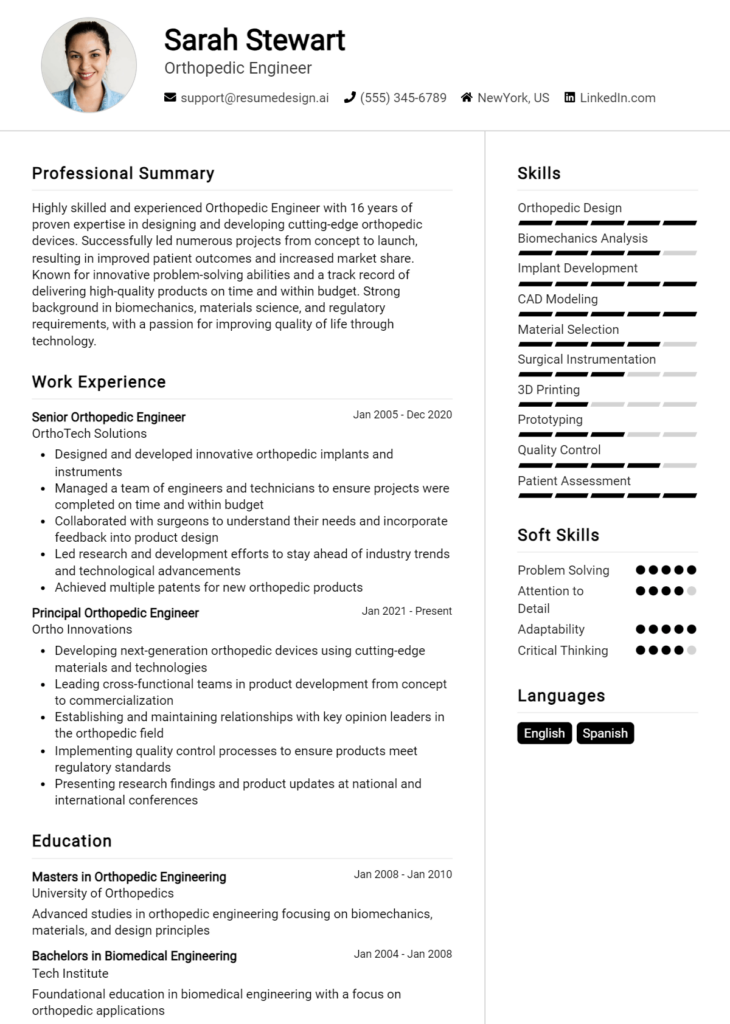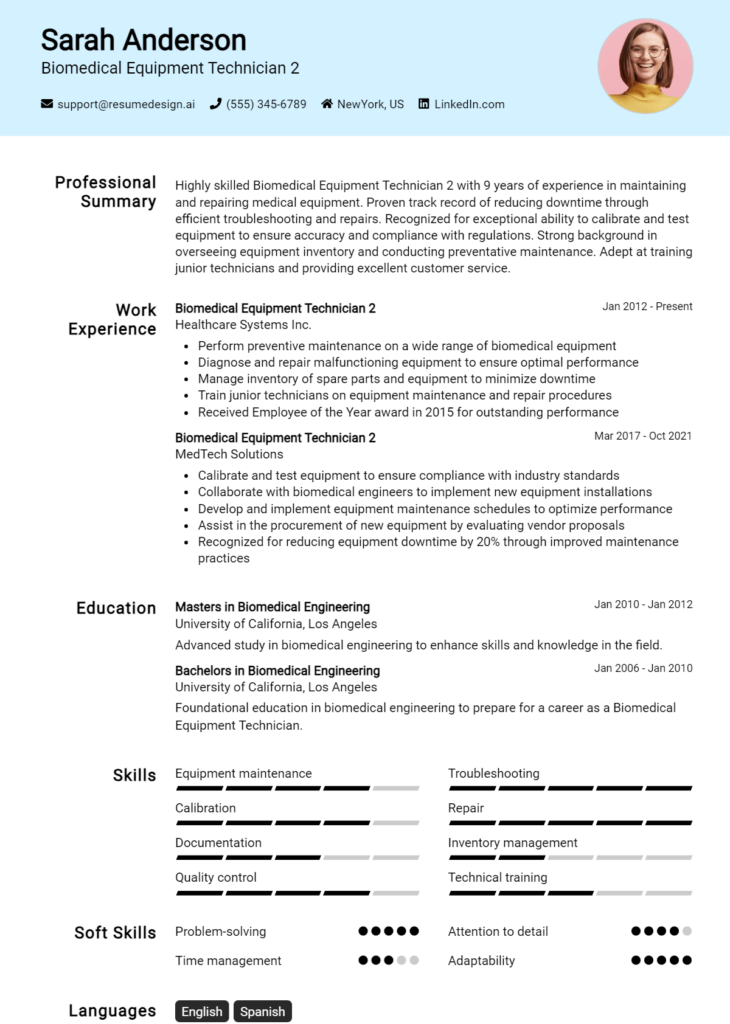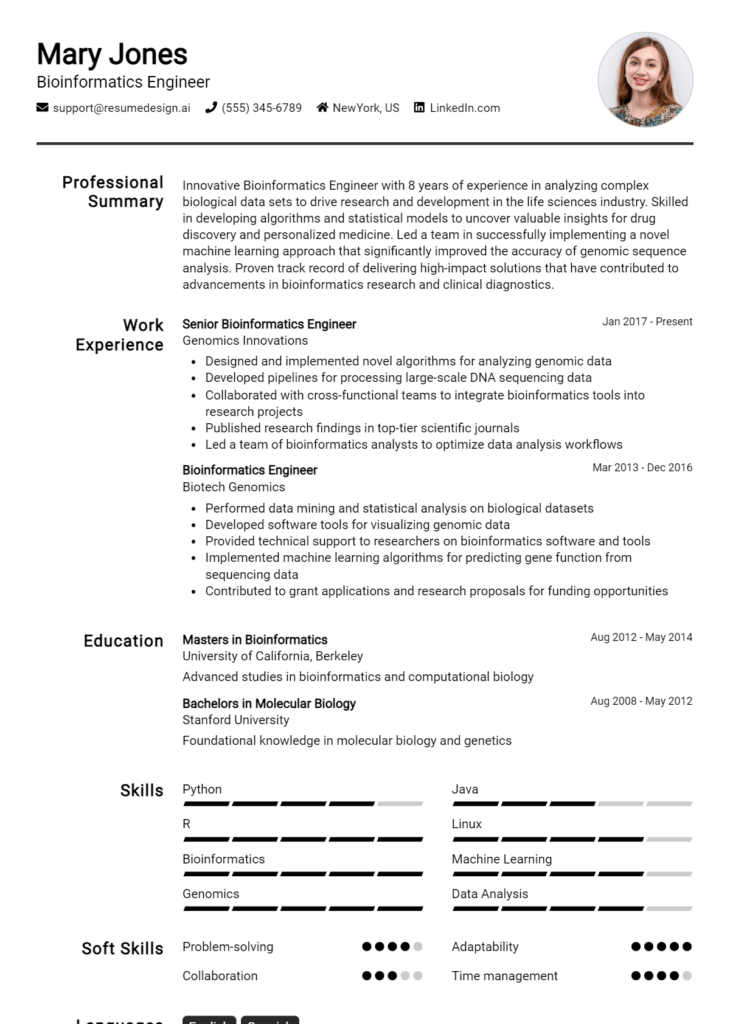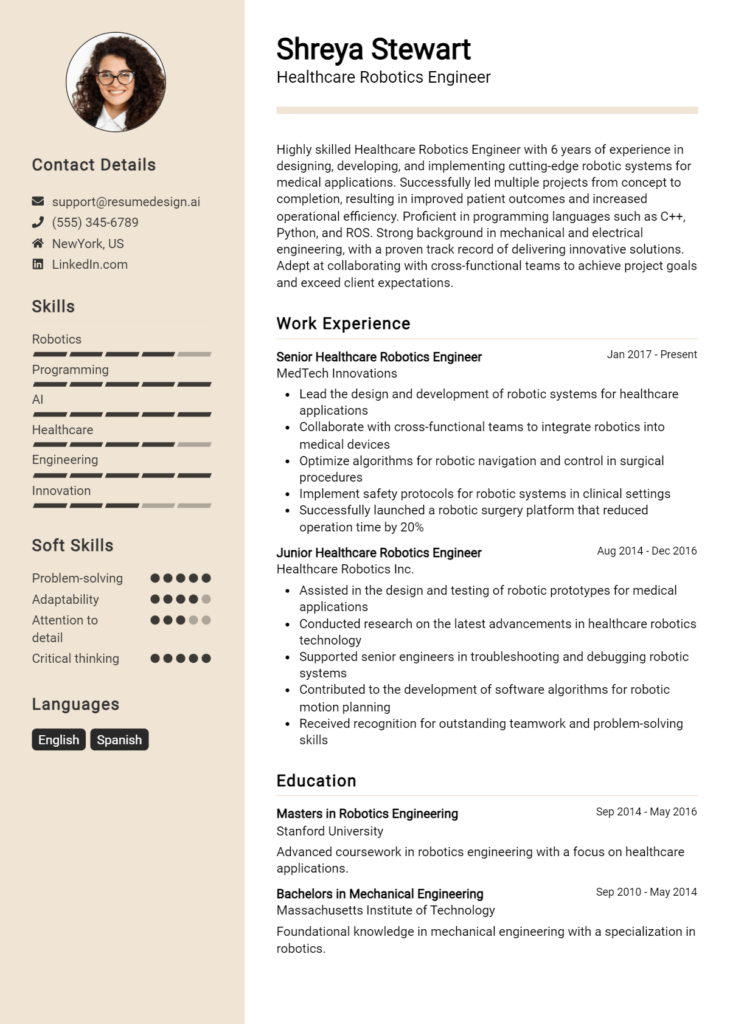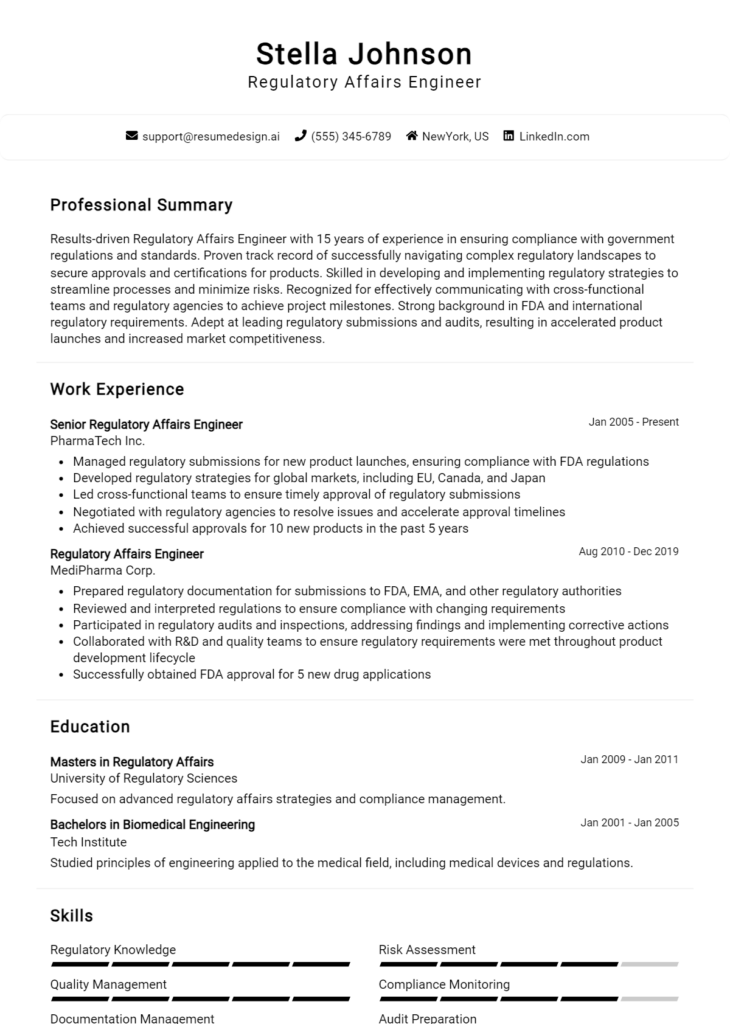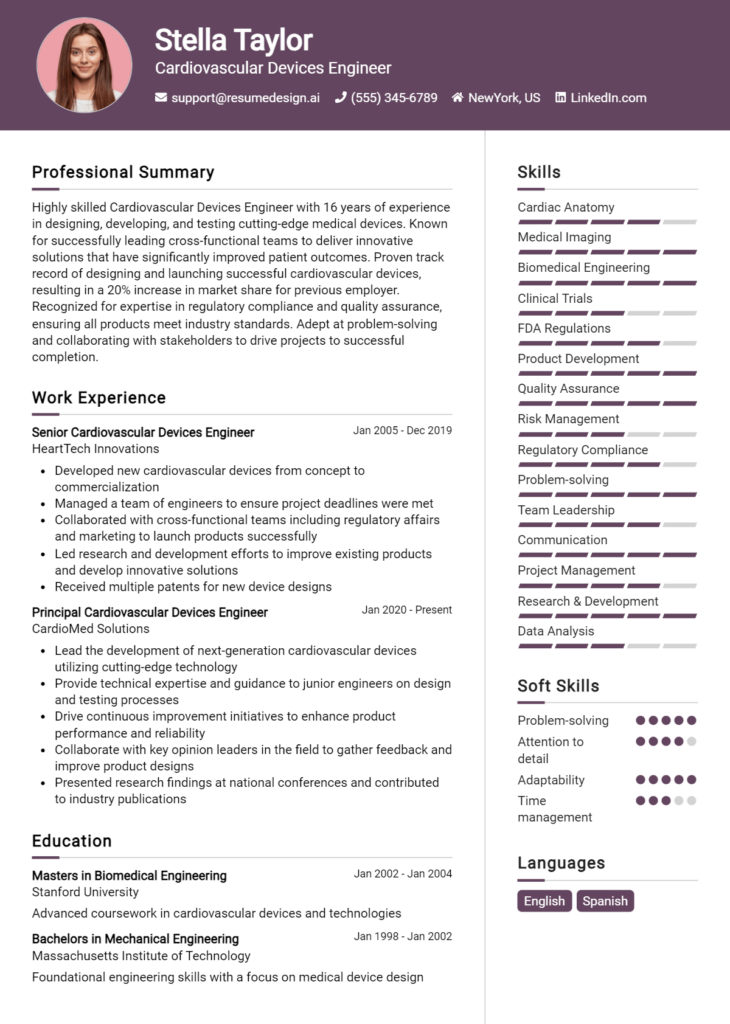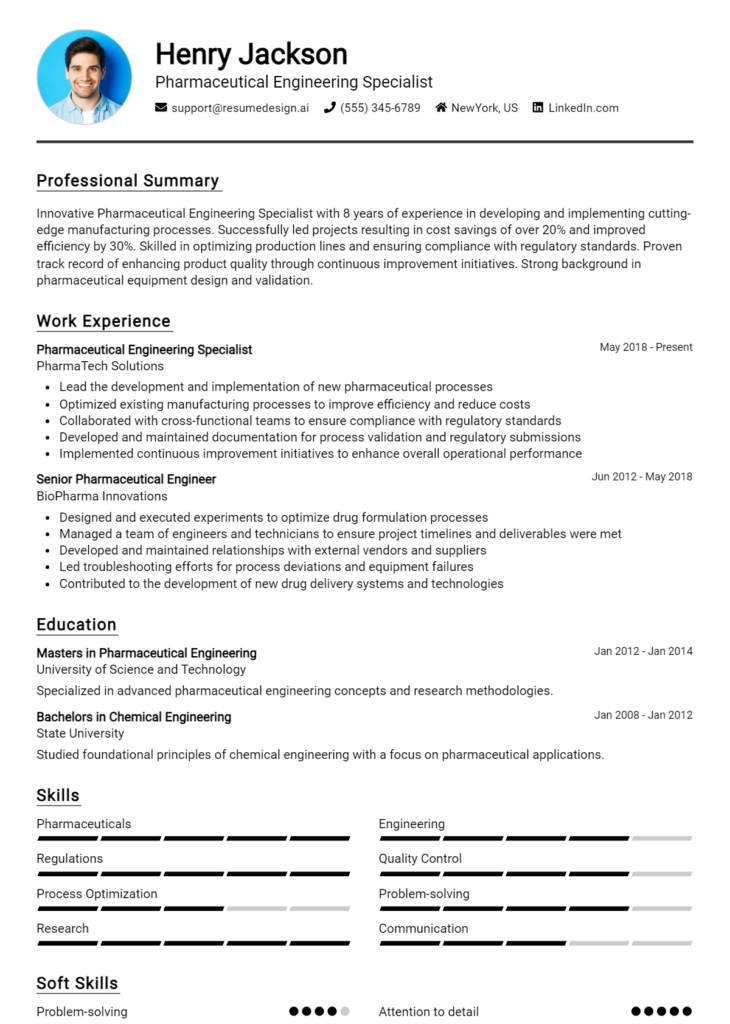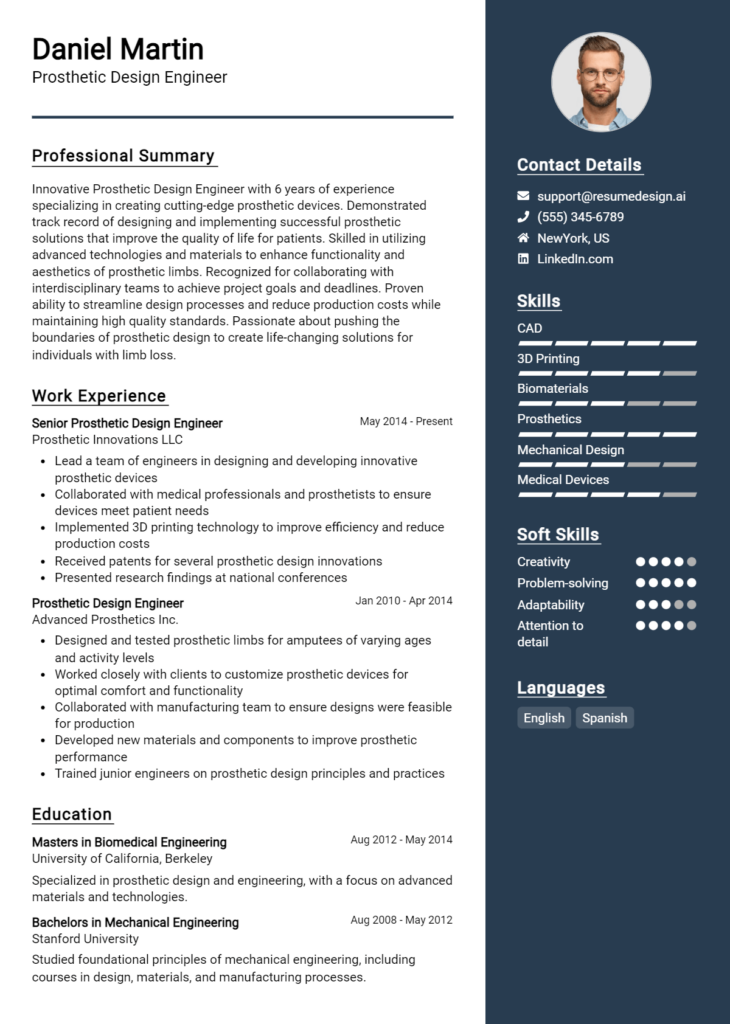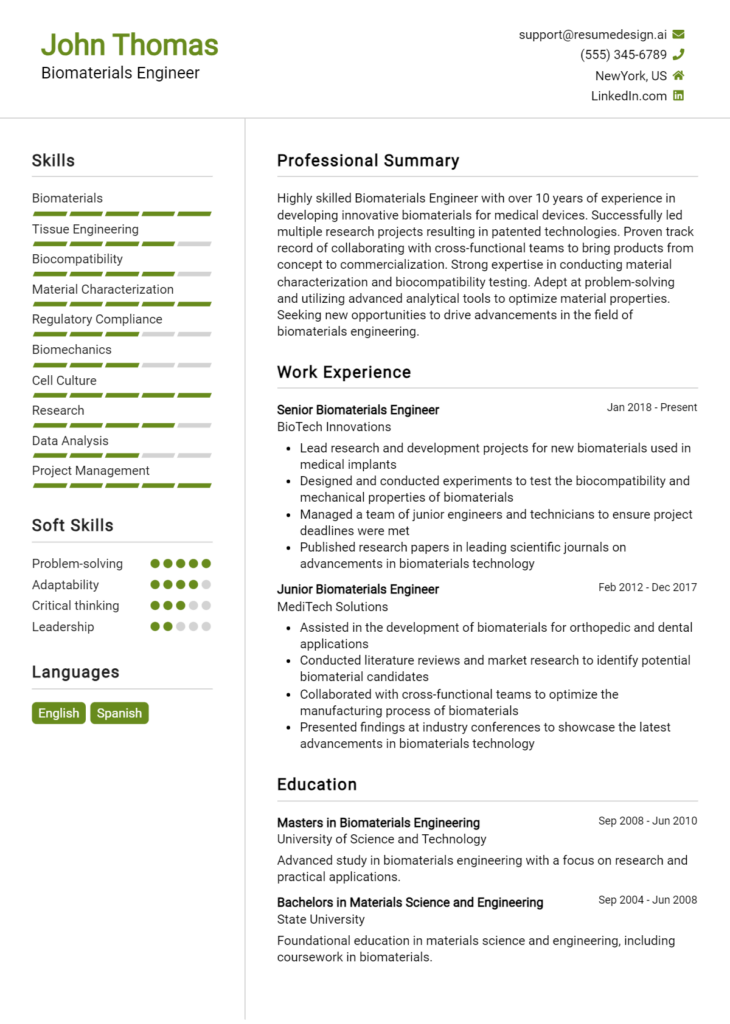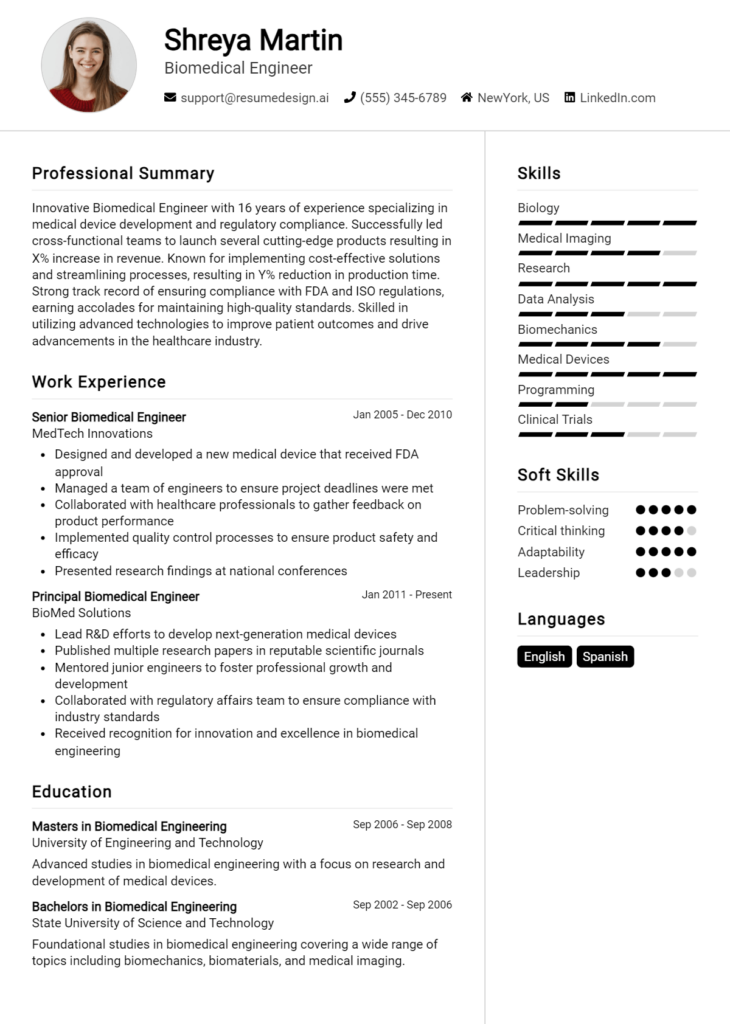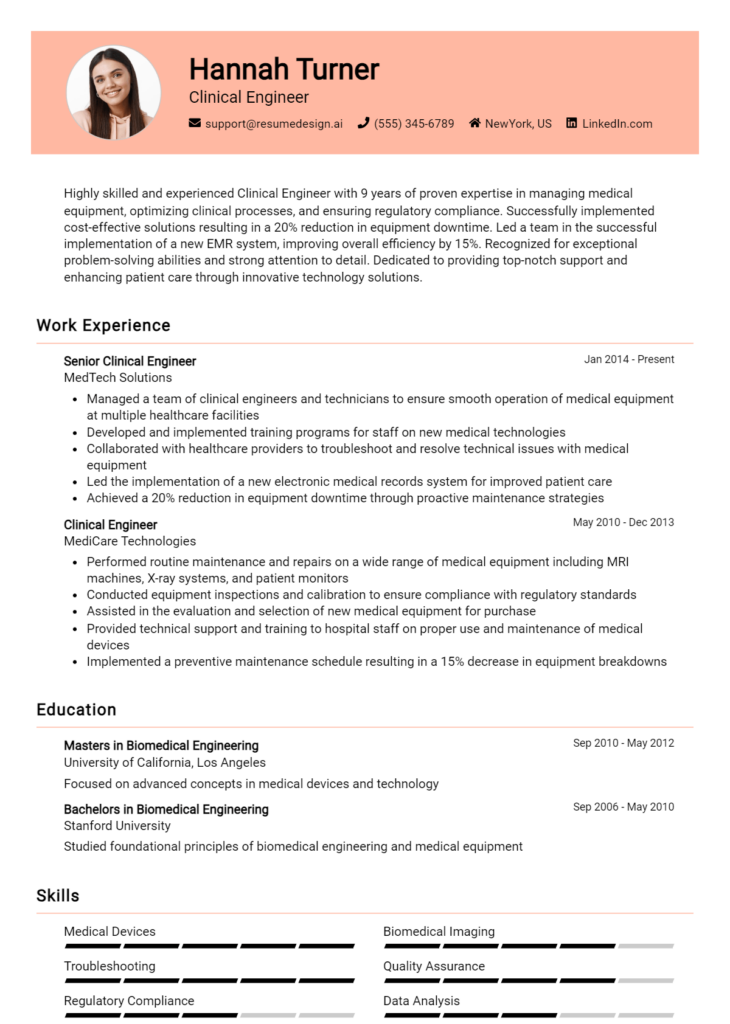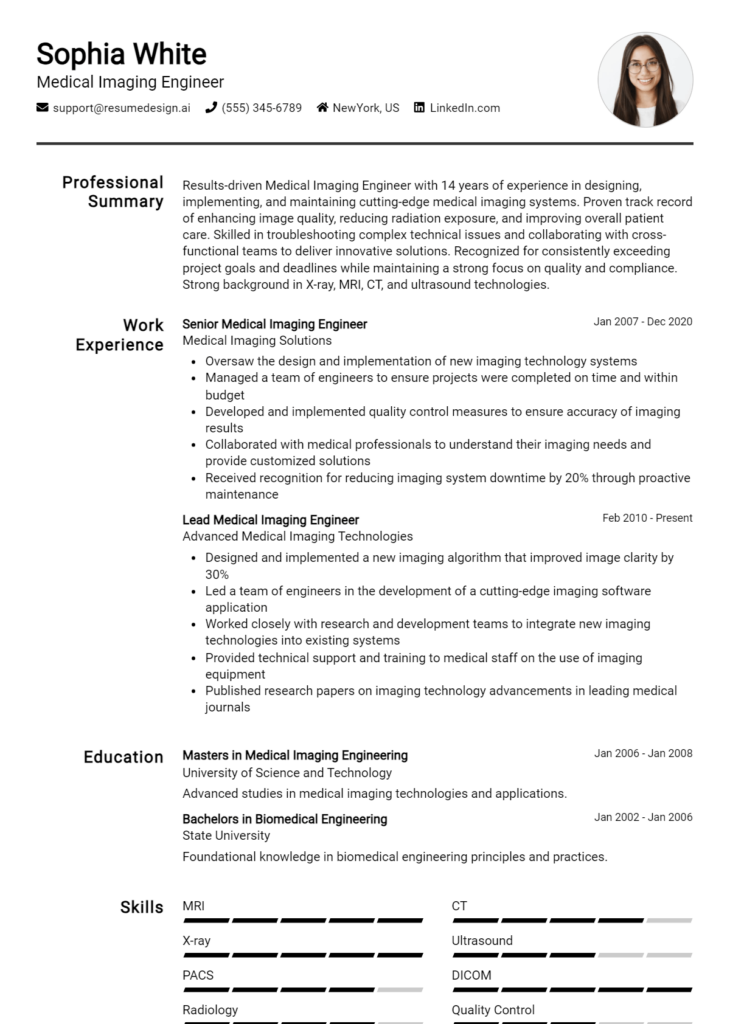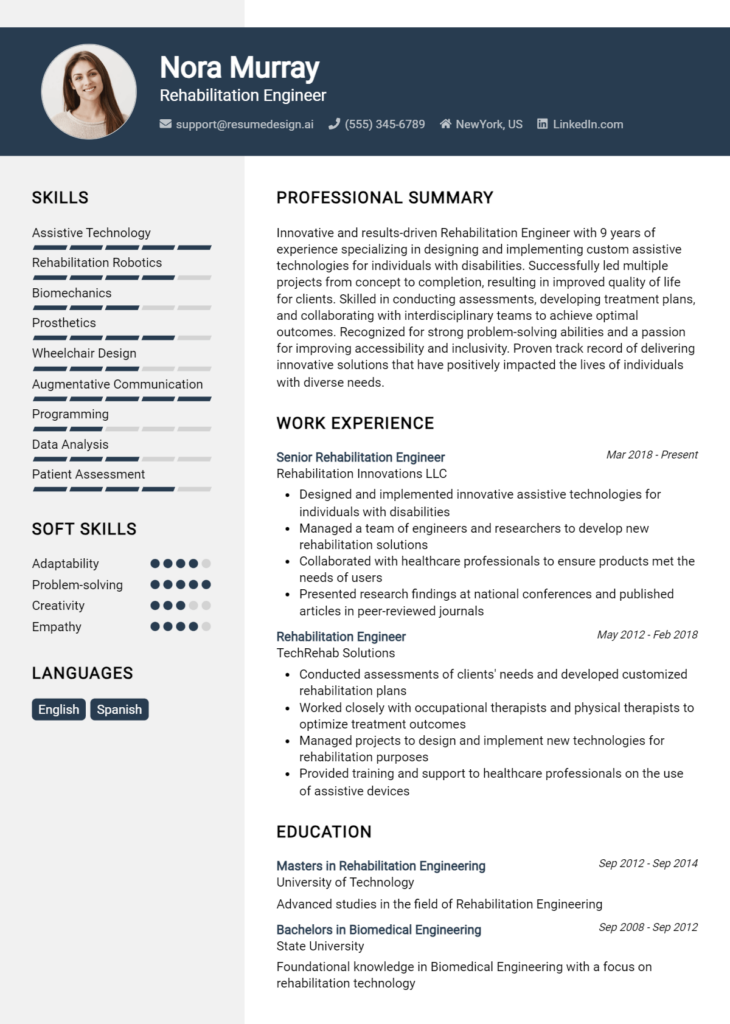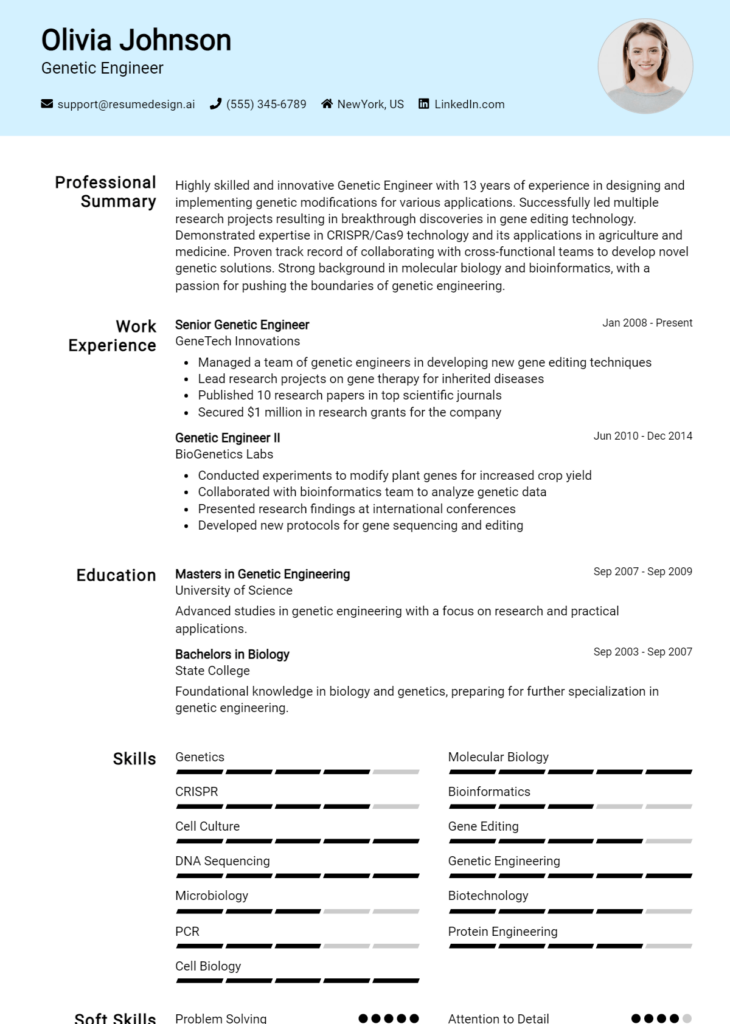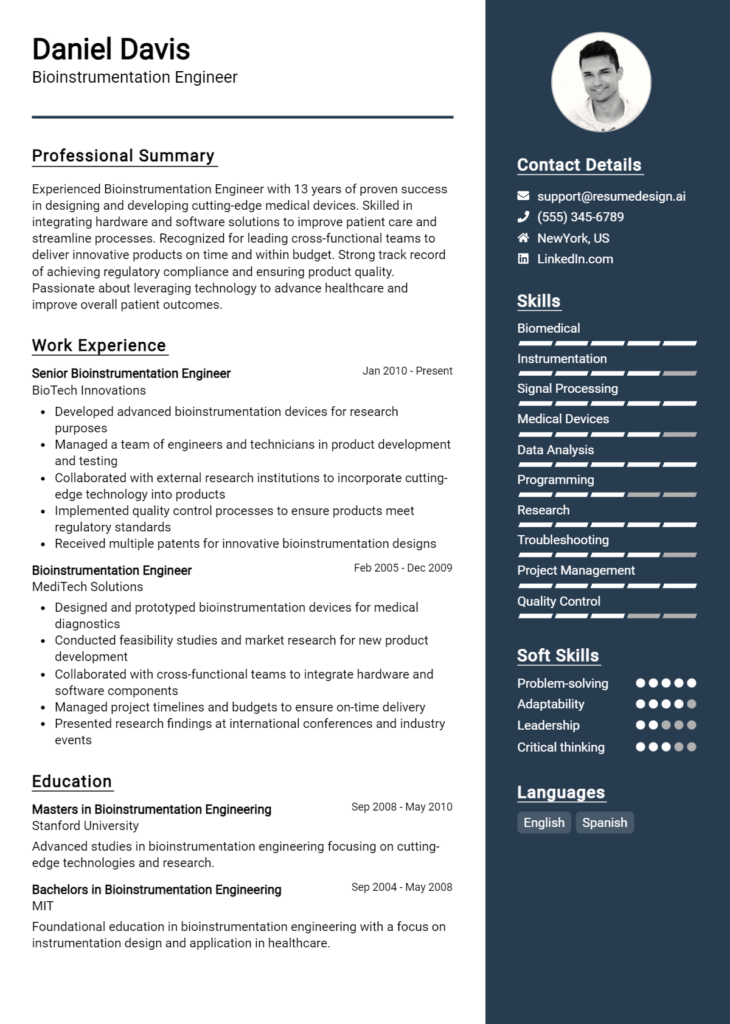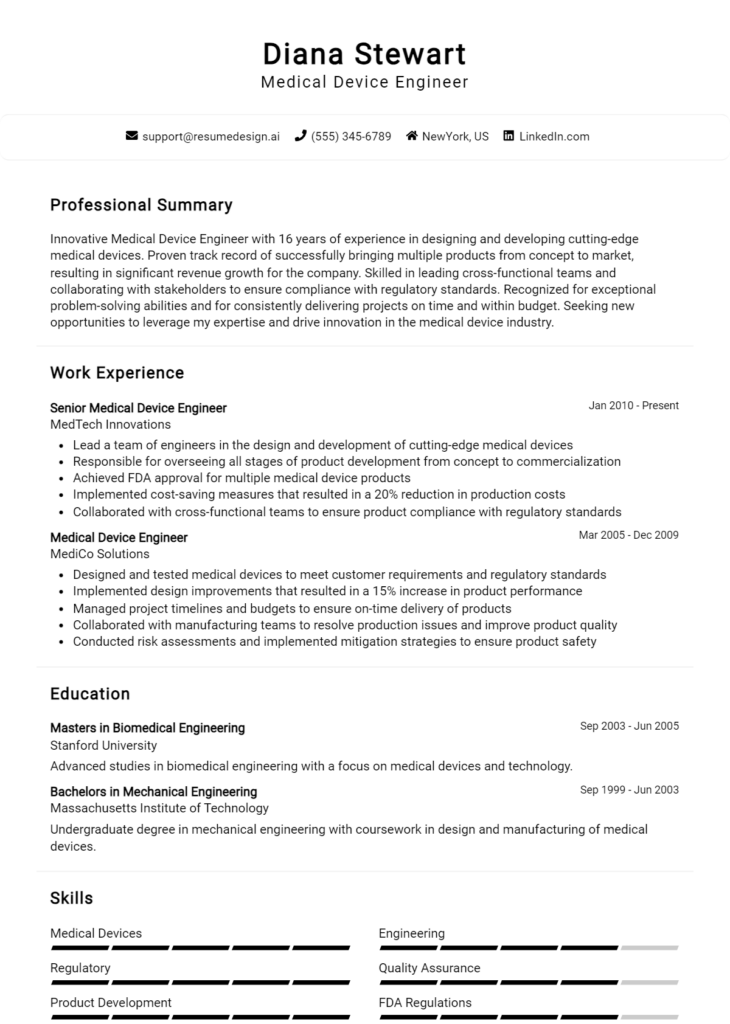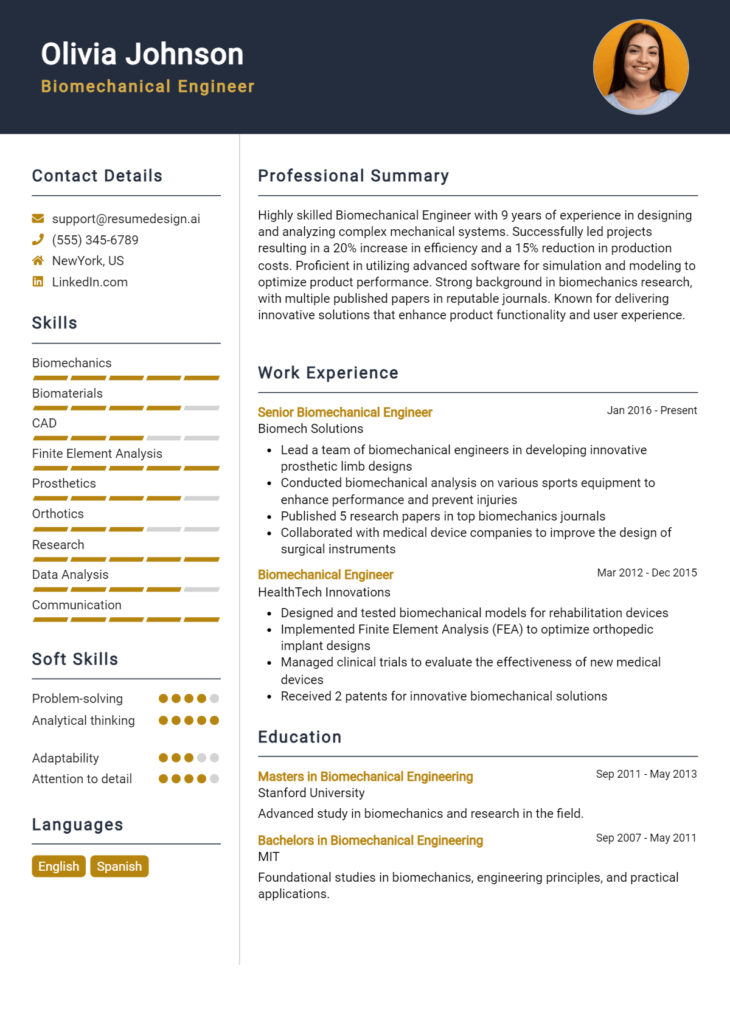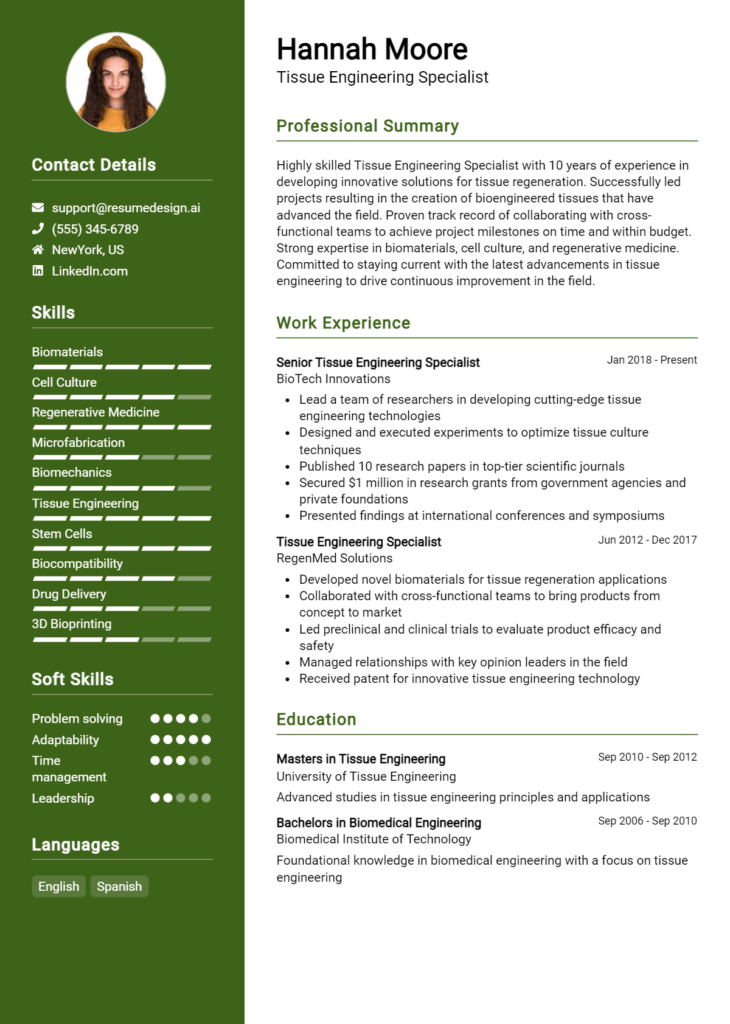Neuroengineering Specialist Core Responsibilities
A Neuroengineering Specialist plays a crucial role in integrating neuroscience with engineering principles to develop advanced medical technologies. Key responsibilities include designing neural interfaces, conducting research on brain-computer interactions, and collaborating with interdisciplinary teams such as neuroscience, software development, and biomedical engineering. Essential skills encompass technical proficiency in programming and signal processing, operational excellence in project management, and strong problem-solving abilities. These competencies are vital for achieving organizational goals, and a well-structured resume can effectively highlight these qualifications.
Common Responsibilities Listed on Neuroengineering Specialist Resume
- Design and develop neuroprosthetic devices and brain-computer interfaces.
- Conduct experiments to evaluate the efficacy of neuroengineering solutions.
- Collaborate with cross-functional teams to integrate engineering solutions into therapeutic applications.
- Analyze neural data using advanced signal processing techniques.
- Implement software tools for real-time data acquisition and analysis.
- Conduct feasibility studies and project planning for neuroengineering projects.
- Maintain compliance with regulatory standards for medical devices.
- Present findings and technical solutions to stakeholders and clients.
- Provide technical support and training to clinical staff and researchers.
- Stay current with advancements in neuroengineering and related fields.
- Publish research findings in peer-reviewed journals and conferences.
High-Level Resume Tips for Neuroengineering Specialist Professionals
In the competitive field of neuroengineering, a well-crafted resume is not just a formality; it can be the decisive factor that shapes a candidate's future. For Neuroengineering Specialists, the resume serves as the first point of contact with potential employers, making it crucial to create a document that effectively highlights both skills and achievements. A strong resume should not only reflect technical expertise and educational background but also demonstrate a commitment to advancing the field of neuroengineering. This guide aims to equip you with practical and actionable resume tips specifically tailored for Neuroengineering Specialist professionals, ensuring that your qualifications stand out in a crowded job market.
Top Resume Tips for Neuroengineering Specialist Professionals
- Tailor your resume to the specific job description by incorporating relevant keywords and phrases.
- Highlight your educational background, including degrees, certifications, and any specialized training in neuroengineering.
- Showcase relevant work experience, focusing on roles that directly relate to neuroengineering projects or research.
- Quantify your achievements by using metrics and specific results to illustrate your impact in previous positions.
- Include industry-specific skills such as neuroimaging techniques, neural signal processing, and programming languages like MATLAB or Python.
- Demonstrate your ability to work in interdisciplinary teams, emphasizing collaboration with clinicians, researchers, and engineers.
- List any publications, presentations, or patents that showcase your contributions to the field of neuroengineering.
- Incorporate a strong summary statement at the top of your resume that encapsulates your career goals and specialized expertise.
- Utilize clear formatting and professional design to enhance readability and create a polished appearance.
By implementing these targeted resume tips, you can significantly enhance your chances of landing a job in the Neuroengineering Specialist field. A well-structured resume that highlights your qualifications and achievements will not only make a strong impression on potential employers but also position you as a standout candidate ready to contribute to the innovative world of neuroengineering.
Why Resume Headlines & Titles are Important for Neuroengineering Specialist
In the competitive field of neuroengineering, crafting a compelling resume is essential for standing out among a pool of qualified candidates. A well-thought-out resume headline or title serves as the first impression, immediately grabbing the attention of hiring managers and providing a succinct summary of the candidate's key qualifications. This impactful phrase should encapsulate the essence of the applicant’s expertise in neuroengineering, showcasing relevant skills and experiences that align with the job in question. A strong headline is not only concise and relevant but also tailored to the specific role being applied for, making it a critical component of a successful resume.
Best Practices for Crafting Resume Headlines for Neuroengineering Specialist
- Be concise: Limit the headline to one impactful sentence.
- Use specific terminology: Incorporate keywords relevant to neuroengineering.
- Highlight key skills: Focus on the most important qualifications for the role.
- Showcase relevant experience: Mention years of experience or specific projects.
- Tailor to the job: Customize the headline for each position applied for.
- Stay professional: Maintain a formal tone appropriate for the industry.
- Avoid jargon: Use clear language that is easily understood by hiring managers.
- Make it compelling: Use action words that convey enthusiasm and expertise.
Example Resume Headlines for Neuroengineering Specialist
Strong Resume Headlines
Innovative Neuroengineering Specialist with 5+ Years of Experience in Brain-Computer Interface Development
Results-Driven Neuroengineer Skilled in Neural Signal Processing and Rehabilitation Technologies
Expert in Neuroprosthetics Design and Implementation, Committed to Advancing Patient Care
Weak Resume Headlines
Neuroengineering Specialist Seeking Job
Experienced Engineer Looking for New Opportunities
The strong headlines are effective because they provide specific details about the candidate's experience and skills, clearly demonstrating their value to potential employers. They use powerful language and relevant keywords that align with the neuroengineering field, making them stand out. In contrast, the weak headlines fail to impress due to their lack of specificity and clarity. They come off as generic and do not communicate the candidate's strengths or qualifications effectively, making it difficult for hiring managers to see the potential fit for the role.
Writing an Exceptional Neuroengineering Specialist Resume Summary
A well-crafted resume summary is crucial for a Neuroengineering Specialist, as it serves as the first impression for hiring managers. In a field that combines neuroscience, engineering, and technology, a strong summary provides a snapshot of key skills, relevant experience, and notable accomplishments that align with the demands of the role. By concisely presenting this information, candidates can quickly capture the attention of decision-makers, making a compelling case for why they are the ideal fit for the position. An impactful summary should be tailored to the specific job being applied for, ensuring it resonates with the hiring team and sets the tone for the rest of the resume.
Best Practices for Writing a Neuroengineering Specialist Resume Summary
- Quantify achievements: Use numbers and data to highlight your contributions and successes.
- Focus on relevant skills: Emphasize technical skills that are critical to neuroengineering, like signal processing and neural interfacing.
- Tailor for the job description: Align your summary with the specific requirements and responsibilities listed in the job posting.
- Be concise: Keep the summary to 3-5 sentences to maintain clarity and impact.
- Use strong action verbs: Start sentences with powerful verbs that convey your experience and capabilities.
- Highlight interdisciplinary knowledge: Showcase your understanding of both neuroscience and engineering principles.
- Showcase certifications or advanced degrees: Mention relevant certifications or educational qualifications that enhance your credibility.
- Include soft skills: Incorporate interpersonal skills that are valuable in collaborative environments, such as communication and teamwork.
Example Neuroengineering Specialist Resume Summaries
Strong Resume Summaries
Innovative Neuroengineering Specialist with over 5 years of experience in developing advanced neural interfaces. Successfully led a team project that designed a brain-computer interface, resulting in a 30% increase in user accuracy. Proficient in MATLAB and Python for signal processing and data analysis.
Detail-oriented Neuroengineering Specialist with a Master's in Biomedical Engineering and a proven track record of improving neuroprosthetic devices. Enhanced device performance by 25% through rigorous testing and iterative design processes. Adept at collaborating with cross-functional teams to achieve project goals.
Dedicated Neuroengineering Specialist with expertise in neuroimaging techniques and machine learning algorithms. Spearheaded a research initiative that developed a novel method for real-time brain activity mapping, reducing analysis time by 40%. Strong communicator with experience presenting findings at international conferences.
Weak Resume Summaries
Neuroengineering Specialist with some experience in the field. Good at problem-solving and working in teams. Looking for a challenging position.
Experienced engineer with a background in neuroscience. Interested in applying engineering skills to neuroengineering projects.
The strong resume summaries effectively highlight specific achievements, quantifiable results, and relevant skills that demonstrate the candidate's suitability for the Neuroengineering Specialist role. In contrast, the weak summaries lack detail and specificity, making them appear generic and unremarkable, which fails to engage hiring managers or effectively showcase the candidate's qualifications.
Work Experience Section for Neuroengineering Specialist Resume
The work experience section of a Neuroengineering Specialist resume is crucial as it serves as a testament to the candidate's technical proficiencies, managerial capabilities, and commitment to delivering high-quality products. This section not only highlights specific engineering skills related to neurotechnology but also emphasizes the candidate's ability to lead multidisciplinary teams and drive projects from conception to execution. Quantifying achievements—such as successful project completions, efficiency improvements, or innovative solutions—while aligning experience with industry standards is essential for standing out in this competitive field.
Best Practices for Neuroengineering Specialist Work Experience
- Clearly articulate technical skills relevant to neuroengineering, including familiarity with neural interfaces, signal processing, and data analysis.
- Quantify achievements with specific metrics, such as percentage improvements in project delivery times or cost savings.
- Highlight leadership roles within projects, focusing on team management, mentoring, and cross-disciplinary collaboration.
- Use action verbs to convey a proactive approach, such as "developed," "implemented," and "designed."
- Tailor experiences to align with industry standards and job requirements, emphasizing relevant technologies and methodologies.
- Include collaborative projects that showcase teamwork and the ability to work with diverse stakeholders, such as researchers, clinicians, and engineers.
- Document continuous learning and professional development, including certifications or training in emerging technologies.
- Maintain clarity and conciseness, avoiding jargon that may not be universally understood outside the neuroengineering field.
Example Work Experiences for Neuroengineering Specialist
Strong Experiences
- Led a cross-functional team to develop a novel brain-computer interface that improved user communication speed by 40%, enhancing quality of life for patients with severe motor disabilities.
- Designed and implemented a signal processing algorithm that increased data accuracy by 30%, resulting in more reliable neurofeedback for clinical applications.
- Managed a project that resulted in a 25% reduction in production costs for neurostimulation devices through process optimization and vendor negotiations.
- Collaborated with neuroscientists and software engineers to launch a research initiative that secured $500,000 in funding for the development of next-generation neural implants.
Weak Experiences
- Worked on projects related to neurotechnology without specifying the outcomes or contributions made.
- Assisted in team efforts that sometimes involved neuroengineering tasks but lacked clarity on individual responsibilities.
- Took part in meetings and discussions regarding neuroengineering topics without detailing the impact or results of those interactions.
- Involved in general engineering tasks that do not specifically relate to neuroengineering or highlight relevant skills.
The strong experiences are considered impactful because they provide specific, quantifiable outcomes and demonstrate leadership, technical expertise, and successful collaboration within the neuroengineering domain. In contrast, the weak experiences lack detail and measurable results, making it difficult for potential employers to gauge the candidate's contributions and capabilities in the field.
Education and Certifications Section for Neuroengineering Specialist Resume
The education and certifications section of a Neuroengineering Specialist resume serves as a crucial element that showcases a candidate's academic achievements, relevant certifications, and commitment to continuous learning in a rapidly evolving field. This section not only highlights foundational knowledge in neuroscience and engineering but also demonstrates the candidate's dedication to keeping up with industry standards and advancements. By including pertinent coursework, specialized training, and recognized certifications, candidates can significantly enhance their credibility and alignment with the specific demands of the Neuroengineering Specialist role.
Best Practices for Neuroengineering Specialist Education and Certifications
- Include relevant degrees such as a Master's or Ph.D. in Neuroengineering, Biomedical Engineering, or Neuroscience.
- List industry-recognized certifications, such as Certified Neurotechnologist (CNT) or Neurofeedback Certification.
- Provide details about relevant coursework that aligns with the neuroengineering field, such as Neural Interfaces or Signal Processing.
- Highlight any specialized training programs or workshops that focus on neurotechnology applications.
- Use clear and concise language, avoiding jargon that may confuse the reader.
- Organize the section in reverse chronological order to showcase the most recent achievements first.
- Include honors or distinctions received during academic or certification pursuits to emphasize excellence.
- Tailor the education and certifications section to match the specific requirements of the job being applied for.
Example Education and Certifications for Neuroengineering Specialist
Strong Examples
- M.S. in Neuroengineering, Stanford University, 2022
- Certified Neurotechnologist (CNT), Neurotechnology Certification Board, 2023
- Relevant Coursework: Neural Signal Processing, Brain-Computer Interface Design
- Completed Advanced Training in Neuroimaging Techniques, 2021
Weak Examples
- Bachelor's in Psychology, University of Anywhere, 2010
- Certification in Basic Computer Skills, 2015
- Relevant Coursework: Introduction to Biology, 2008
- Attended a one-day seminar on General Healthcare, 2019
The examples listed in the "Strong Examples" section are considered strong because they directly relate to the Neuroengineering Specialist role, showcasing advanced degrees and certifications that are respected in the field. In contrast, the "Weak Examples" include qualifications that are either outdated, irrelevant, or lack the specificity needed to demonstrate expertise in neuroengineering, ultimately failing to convey the candidate's alignment with the demands of the position.
Top Skills & Keywords for Neuroengineering Specialist Resume
In the rapidly evolving field of neuroengineering, having a well-crafted resume that highlights relevant skills is essential for standing out in the competitive job market. A Neuroengineering Specialist must possess a unique blend of both hard and soft skills to effectively bridge the gap between engineering and neuroscience. These skills not only demonstrate technical competency but also showcase the ability to collaborate, innovate, and communicate complex ideas effectively. By strategically incorporating key skills into your resume, you can better position yourself as a strong candidate in this interdisciplinary field. For more information on how to enhance your resume, you can explore additional skills and work experience tips.
Top Hard & Soft Skills for Neuroengineering Specialist
Soft Skills
- Problem-solving
- Communication
- Team collaboration
- Critical thinking
- Adaptability
- Time management
- Creativity
- Attention to detail
- Empathy
- Leadership
Hard Skills
- Signal processing
- Biomedical engineering principles
- Neural interfacing technologies
- Data analysis and interpretation
- Programming languages (Python, MATLAB)
- Electrophysiology techniques
- Machine learning applications
- Imaging techniques (fMRI, PET)
- Circuit design
- Research methodologies
Stand Out with a Winning Neuroengineering Specialist Cover Letter
I am writing to express my interest in the Neuroengineering Specialist position at [Company Name], as advertised on [Job Board/Company Website]. With a robust background in neural engineering, coupled with my passion for advancing brain-computer interface technologies, I am excited about the opportunity to contribute to your innovative projects. My academic training, combined with hands-on experience in neuroprosthetic development and data analysis, has equipped me with the skills necessary to excel in this role.
During my tenure at [Previous Company/Institution], I successfully led a project focused on developing an adaptive neural interface that enhanced communication for patients with motor disabilities. This experience honed my technical skills in signal processing and machine learning, as well as my ability to collaborate with cross-functional teams. Additionally, my research on the integration of neurofeedback systems has provided me with a deep understanding of user-centered design and the importance of tailoring solutions to meet individual patient needs.
I am particularly drawn to [Company Name] due to its commitment to pioneering advancements in neurotechnology and its focus on improving the quality of life for individuals with neurological disorders. I am eager to bring my expertise in neuroengineering to your team, fostering innovation and driving impactful results. I am confident that my proactive approach and dedication to continuous learning will make me a valuable asset in achieving [Company Name]’s mission.
Thank you for considering my application. I look forward to the possibility of discussing how my background and enthusiasm for neuroengineering align with the goals of your team. I am excited about the potential to contribute to groundbreaking projects at [Company Name] and to help shape the future of neuroengineering.
Common Mistakes to Avoid in a Neuroengineering Specialist Resume
When crafting a resume for a Neuroengineering Specialist position, it's essential to present your skills and experiences clearly and effectively. However, many candidates often make common mistakes that can undermine their qualifications and reduce their chances of securing an interview. Understanding these pitfalls can help you create a more compelling resume that accurately reflects your expertise in neuroengineering.
Neglecting to Tailor the Resume: Failing to customize your resume for the specific job description can lead to a generic application that does not highlight relevant skills or experiences.
Overloading with Technical Jargon: While technical skills are crucial in neuroengineering, excessive jargon can confuse hiring managers who may not be specialists in every aspect of the field.
Ignoring Soft Skills: Many candidates focus solely on technical abilities while neglecting to showcase essential soft skills like communication, teamwork, and problem-solving, which are vital in collaborative environments.
Not Quantifying Achievements: Simply listing job responsibilities without quantifiable outcomes can make your contributions seem less impactful. Use metrics to demonstrate your successes, such as improvements in project efficiency or research findings.
Using an Unorganized Format: A cluttered or poorly structured resume can make it difficult for hiring managers to quickly identify your qualifications. Utilize clear headings and bullet points for easy navigation.
Including Irrelevant Information: Avoid adding experiences or skills that do not pertain to the neuroengineering field, as this can dilute the focus of your resume and distract from your relevant qualifications.
Failing to Proofread: Typos and grammatical errors can create a negative impression and suggest a lack of attention to detail, which is critical in technical roles.
Omitting Continuing Education: Neuroengineering is an evolving field; neglecting to include relevant certifications, workshops, or courses can indicate a lack of commitment to professional development.

